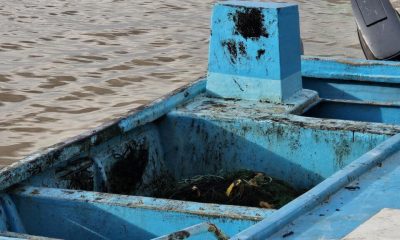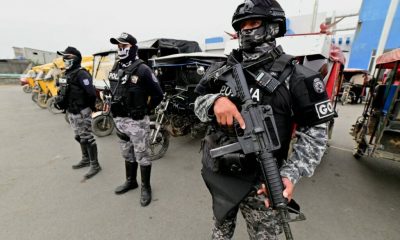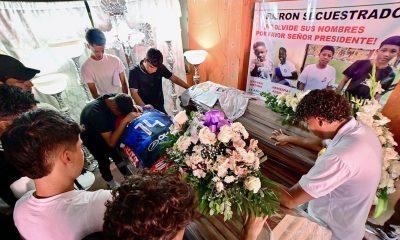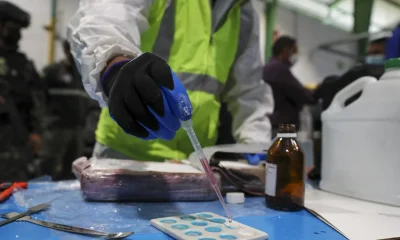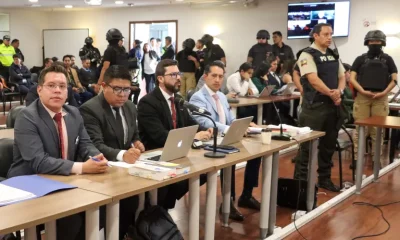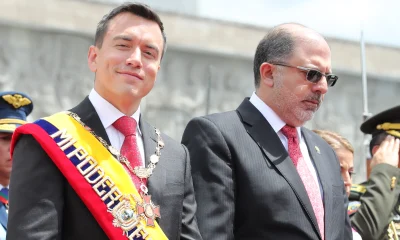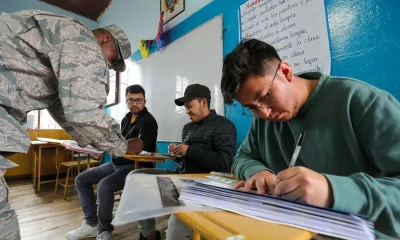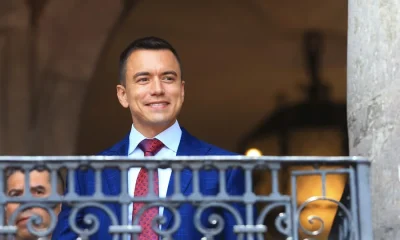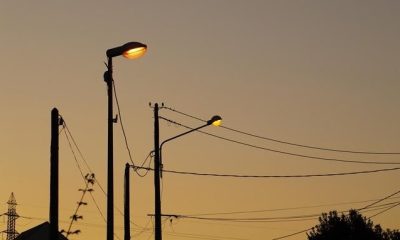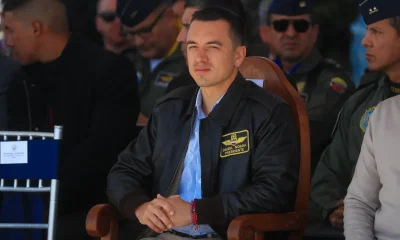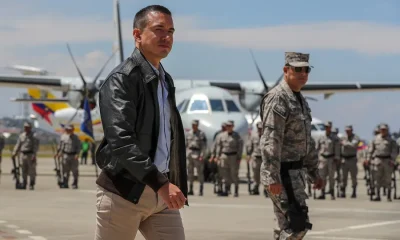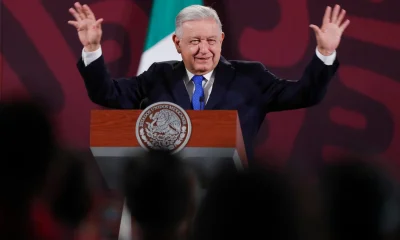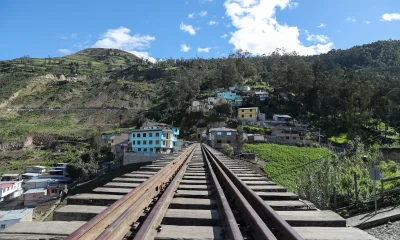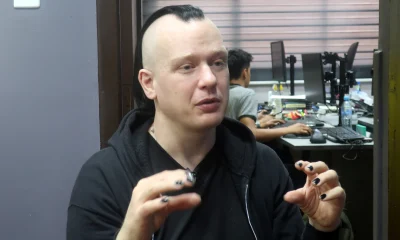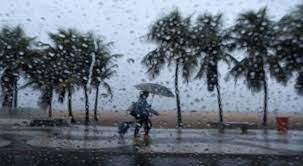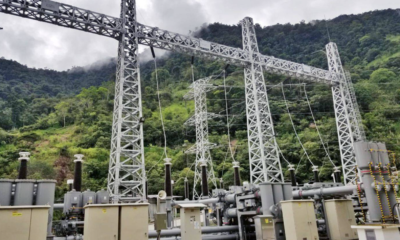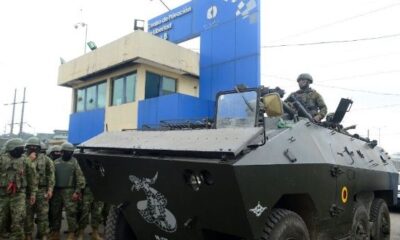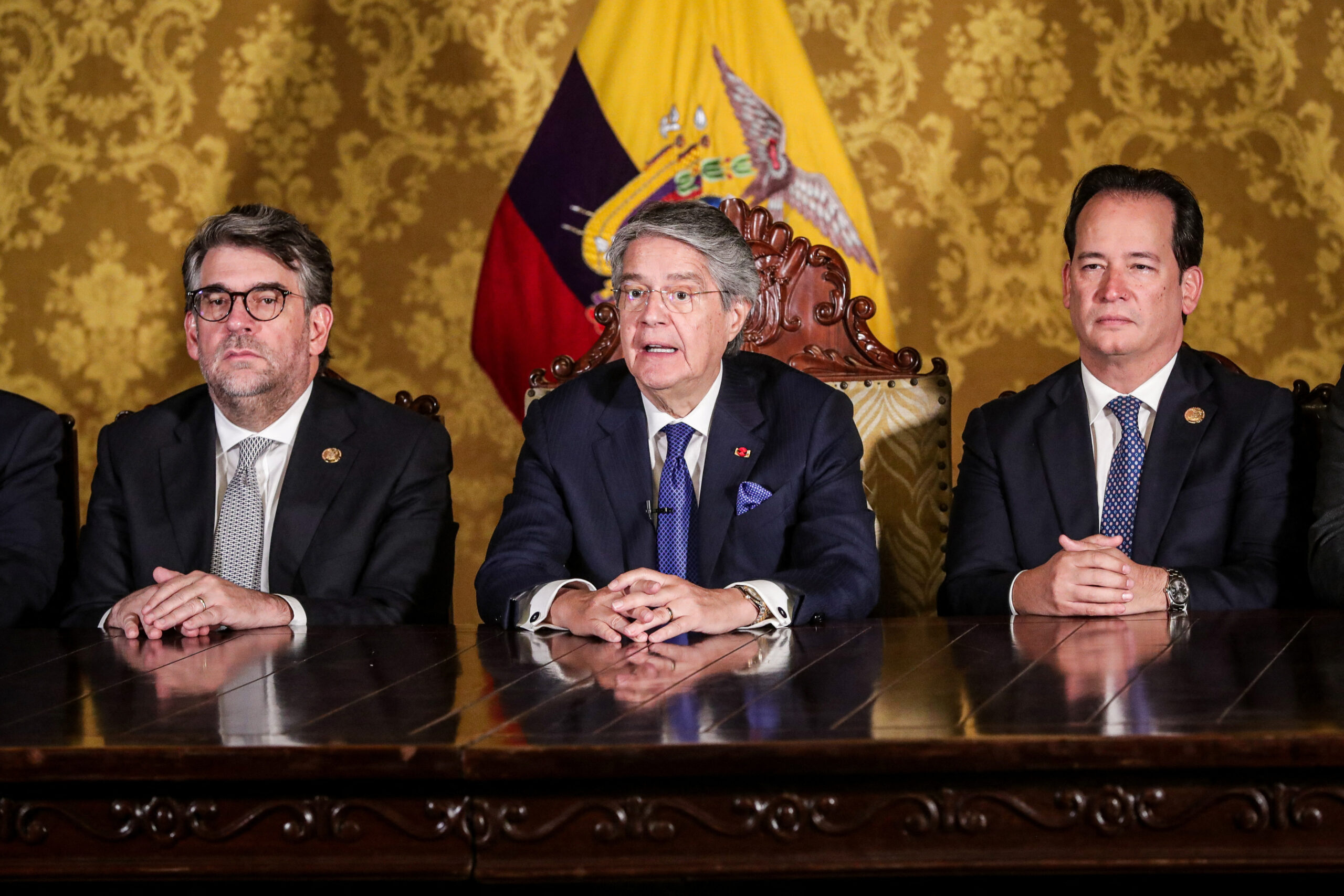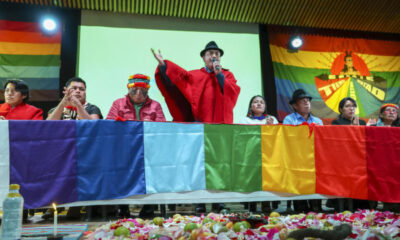International
Ecuador: Lasso admits defeat in referendum, calls for unity
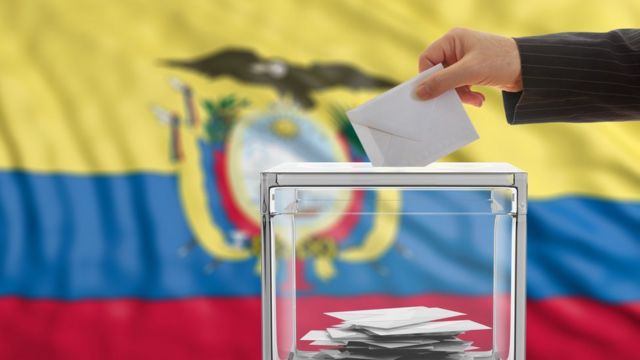
February 7th |
The president of Ecuador, Guillermo Lasso, admitted on Monday that the adverse results in a referendum and the election of sectional authorities held on Sunday were a wake-up call to the government, before which he called for a great national agreement to solve the demands of Ecuadorians.
The winners of these elections were the opposition parties Union for Hope, of former President Rafael Correa, and Pachakutik, of the indigenous people, according to preliminary results.
In a radio and television chain, Lasso said that beyond the results, citizens yearn for a better country with more security, better education and health, more work, better jobs and salaries.
“What happened on Sunday was a wake-up call from the people to the government and we will not shirk that responsibility.”
He added that after those results the “commitment with Ecuadorians becomes even firmer” on issues such as security, job generation and expansion of social assistance, among others, while ratifying his decision to get closer to the people, to listen and to learn.
With around 50% of the votes counted, the tendency was that the “No” was imposed in the eight questions posed in the referendum promoted by the government and whose attention was focused on the issue of citizen security, in a country hit by the problem of criminality and drug trafficking.
The referendum was seen as a thermometer of the performance of Lasso, a 67-year-old banker who took office in May 2021.
“The results are dramatic for the government, because the consultation could have been an oxygen tank for a highly unpopular government,” said Grace Jaramillo, of the University of British Columbia in Vancouver, Canada, in an interview with AP. He still has two years of “extremely difficult government left, with probable attempts to remove him from power”.
As for the elections, Correa’s party (2007-2017), obtained important results. Correa resides abroad.
According to partial results, the candidates of Union for Hope Pabel Muñoz and Aquiles Álvarez won the mayoralties of Quito and Guayaquil, respectively. In the municipality of Guayaquil they obtained a triumph leaving behind 31 years of government of the right-wing Social Christian party.
Meanwhile, Paola Pabón won the election for the prefecture (governorship) of the province of Pichincha, Marcela Aguiñaga in that of Guayas and Leonardo Orlando in that of Manabí, which are among the most important in the country.
Analyst Mónica Banegas, of the network of political scientists and director of the Haciendo Ecuador Foundation, told AP that the government is “very worn out and besieged” by an adverse political environment, in which not only the government but also the country loses because there were questions to solve institutional and people’s problems.
In the central Andean highlands, the opposition party Pachakutik, also of the indigenous people, has won three prefectures and several mayoralties. The indigenous movement cornered the government for three weeks last June with violent protests to reject an increase in gasoline prices.
Three of the eight questions were related to security, including one on constitutional reforms to allow extradition of Ecuadorians wanted by other countries in criminal proceedings for drug trafficking or organized crime. The Ecuadorian Constitution does not currently allow for the extradition of nationals to face trials or serve sentences in other countries.
This was one of the questions most promoted by the Lasso government, appealing to the insecurity in the country and in a social context of fear and perception of vulnerability due to the increase in crimes.
Ecuador ended last year with a record number of murders. The 4,539 violent deaths in 2022, according to the police count, are more than double the 2,048 crimes in 2021 and, in addition, the highest record since 1990 when this type of statistics began to be counted. Only about 300 cases were solved, according to authorities.
In view of citizen disenchantment with politics and institutions, two questions sought changes in the functioning of the Council of Citizen Participation, which appoints the main control authorities such as the prosecutor, the attorney general or comptroller, and two others had to do with political parties and the composition of the National Assembly, the institution with the worst percentage of citizen approval, according to polls.
According to analyst Banegas, Lasso must now initiate dialogues with all political and social sectors, change his strategy and tune in with the needs of the majorities in order to survive the remaining two years in power, she said.
International
Federal Judge Blocks Trump Policy Allowing Deportations to Third Countries

A federal judge ruled on Wednesday that the policy of U.S. President Donald Trump’s administration allowing immigration authorities to deport foreign nationals to third countries without prior notice or the opportunity to object is unlawful. The decision marks another legal setback for the administration on immigration matters.
Judge Brian Murphy of the U.S. District Court for the District of Massachusetts struck down the regulation issued last year, which stated that Immigration and Customs Enforcement (ICE) was not required to notify migrants if they were to be sent to countries other than the one listed in their removal order, provided that receiving nations offered assurances they would not face persecution or torture.
Murphy ordered the measure vacated but granted a 15-day delay before the ruling takes effect, giving the Trump administration time to file an appeal.
In his decision, the judge concluded that the policy violates federal immigration law and migrants’ due process rights. He also questioned the lack of transparency surrounding the alleged assurances provided by receiving countries, stating that “no one really knows anything about these supposed ‘assurances.’” He added, “It is not right, and it is not lawful.”
The ruling follows several legal disputes involving deportations to third countries. Last year, the executive branch deported more than 200 Salvadorans to a maximum-security prison in El Salvador, invoking an old wartime law. The White House also held talks with Costa Rica, Panama, and Rwanda about receiving migrants who are not citizens of those countries.
In May, the same judge determined that the government violated a court order when it attempted to remove a group of immigrants with criminal records to South Sudan without prior notice or an opportunity to raise claims of fear of persecution.
Although President Donald Trump took the case to the U.S. Supreme Court, which temporarily allowed the deportations to resume while a final decision was pending, the White House is expected to again appeal to higher courts to overturn this latest judicial ruling.
International
Cocaine Production Surges 34% in 2023 as Market Expands into Africa and Asia

The global cocaine market is the fastest-growing among all illicit drugs worldwide, the International Narcotics Control Board (INCB) warned on Thursday in its annual report presented in Vienna.
The body attributes this expansion to the sustained rise in production in South America — particularly in Colombia — as well as increasing demand in emerging regions such as Africa and Asia.
According to the report, global cocaine production surpassed 3,700 metric tons in 2023, marking a 34% increase compared to 2022. This growth is largely driven by the expansion of illicit coca cultivation in Colombia and the greater production capacity of clandestine laboratories.
The INCB noted that the market has not only grown in volume but has also diversified and become more globalized. While Europe and North America remain the primary destinations, trafficking routes now reach “all regions of the world,” including Africa — traditionally considered a transit zone — and Asia, where the presence of cocaine was previously marginal.
In Western and Central Europe, for the fifth consecutive year, seizures in 2023 exceeded those in North America, consolidating the region as the leading destination market. Between January 2019 and June 2024, more than 1,826 metric tons of drugs bound for European ports were seized, of which 82% was cocaine, equivalent to 1,487 metric tons.
The report also highlights that seizures in Africa rose by 48% in 2023 compared to 2022, reflecting the expansion of the market on the continent. Globally, the number of cocaine users increased from 17 million in 2013 to 25 million in 2023.
International
Clinton Accuses Republican Committee of Using Epstein Case to Shield Trump
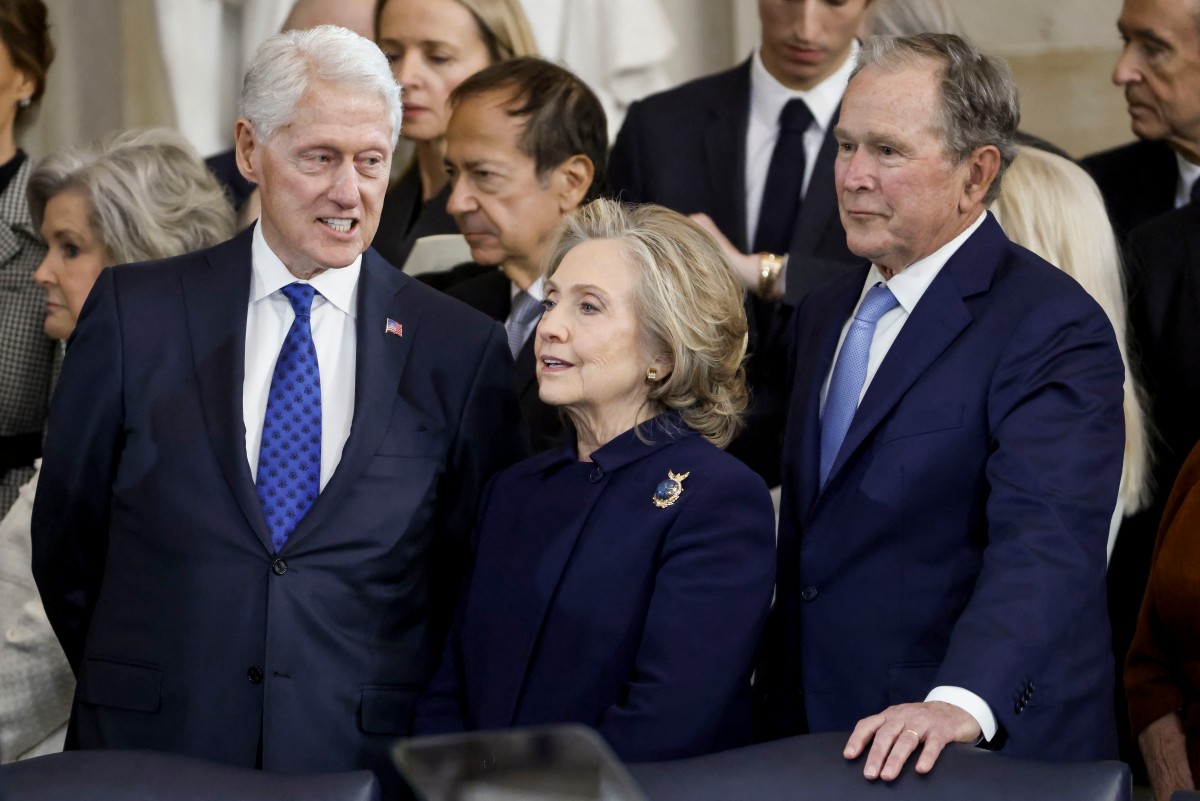
Former U.S. Secretary of State and former First Lady Hillary Clinton denied on Thursday before a congressional committee that she had ever met convicted sex offender Jeffrey Epstein in person or had any knowledge of the crimes he committed.
Clinton testified behind closed doors from New York before the House Oversight Committee. The wife of former President Bill Clinton — who is scheduled to testify on Friday — accused the Republican-controlled committee of summoning her in order to “distract attention” and “cover up” the activities of President Donald Trump, who had past ties to Epstein.
“I do not recall ever meeting Mr. Epstein. I never flew on his plane nor visited his island, his homes, or his offices. I have nothing further to add,” she stated.
The former Secretary of State emphasized that she “had no idea about the criminal activities” of the financier, who died in prison in 2019. “Like any decent person, I was horrified when I learned of his crimes,” she said.
Clinton described the Epstein case as “a tragedy” and “a scandal” that deserves “a thorough investigation,” but criticized the committee for failing to summon what she called the truly relevant individuals.
“Instead, you have asked me to testify, knowing that I have no knowledge that would serve your investigation, with the purpose of distracting from President Trump’s activities and shielding him despite the legitimate demand for answers,” she said.
The questioning, conducted behind closed doors in Chappaqua, New York — where the Clintons reside — took place one day before former President Bill Clinton was scheduled to appear at the same location.
Although the Clintons initially declined to testify before Congress, the threat of being held in contempt ultimately led the former presidential couple to agree to appear and explain their relationship with Epstein.
-

 International2 days ago
International2 days agoFamily of “El Mencho” Seeks Return of Body After Deadly Military Operation
-

 International2 days ago
International2 days agoLarry Summers Steps Down from Harvard Role Amid Epstein Controversy
-
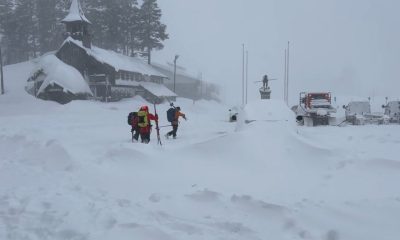
 International5 days ago
International5 days agoNinth Victim Recovered After Deadliest U.S. Avalanche in Decades
-

 International2 days ago
International2 days agoIran’s President Optimistic Ahead of Geneva Nuclear Talks with U.S.
-

 International4 days ago
International4 days agoOver 40 Million Affected by Major Snowstorm in Northeastern U.S.
-

 International2 days ago
International2 days agoStephen Hawking Photo Appears in Newly Released Epstein Documents
-

 International2 days ago
International2 days agoBill Gates Admits “Serious Mistake” Over Epstein Ties
-

 International4 days ago
International4 days agoNine People Killed in Two Armed Attacks in Manabí, Ecuador
-

 International12 hours ago
International12 hours agoCocaine Production Surges 34% in 2023 as Market Expands into Africa and Asia
-

 International12 hours ago
International12 hours agoFederal Judge Blocks Trump Policy Allowing Deportations to Third Countries
-

 International12 hours ago
International12 hours agoClinton Accuses Republican Committee of Using Epstein Case to Shield Trump



























